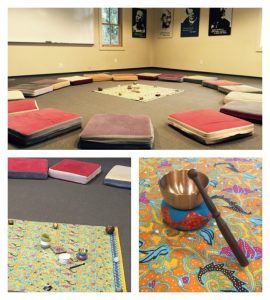Hyla Stories
What is Council?

 Once a week students come to Human Relations class and sit in a circle for Council. David Maron describes Council as “a talking circle, a ritualized space for sharing stories and listening.” Each session asks a question, and one by one, students offer their answers to that question. The person speaking holds a talking piece to indicate that they have the floor. When they are finished, they pass the talking piece to the next person, moving in one direction until the circle is complete. In addition to David Maron, Kris Rogers (Hyla Counselor and Dean of Students) attends sixth grade Council, while Jenine Adam attends seventh and eighth.
Once a week students come to Human Relations class and sit in a circle for Council. David Maron describes Council as “a talking circle, a ritualized space for sharing stories and listening.” Each session asks a question, and one by one, students offer their answers to that question. The person speaking holds a talking piece to indicate that they have the floor. When they are finished, they pass the talking piece to the next person, moving in one direction until the circle is complete. In addition to David Maron, Kris Rogers (Hyla Counselor and Dean of Students) attends sixth grade Council, while Jenine Adam attends seventh and eighth.
Council creates a safe space where students can share their own stories, and listen to those of their classmates. Unlike a discussion group or counseling, Council is not about responding to what someone else has said, or offering feedback, or working through issues. Instead, Council asks students to actively listen and share their own stories. Kris Rogers explains that “the act of listening is hard for this middle school age. It’s hard for them not to want to respond to what someone else is saying. They have to practice patience, wait their turn, and use their turn to say what they want to say rather than in response to someone else’s story.”
The ritualized aspect of Council helps students embrace the safe space it creates. Each session has a symbolic beginning and end that is recognized and respected by all students. The safety of Council is rooted in the confidentiality. “Students this age are so worried about what’s being talked about that is out of their control, so they welcome a safe place knowing that what’s brought up in Council won’t be talked about later,” says David. In this way, Council is about trust and respect. “We are teaching them what respect and confidentiality mean by giving them the chance to practice both every week through questions that draw out every day experiences,” says Kris. “Rather than asking them to practice patience, listening and confidentiality by forcing heavy topics on them,” says Kris, “Council lets us practice these skills when the stakes aren’t so high.” In addition to patience, trust and confidentiality, Council allows students a weekly opportunity to practice a number of other life skills as well, such as reflection, public speaking, and impulse control.
Through the process of weekly meetings, students get to know one another. “It breeds companionship and builds community through common stories because,” says David, “Council is based on things that middle school students reflect on and have insight into.” Kris adds, “What comes up in Council is age appropriate and reflects what they’re going through at this stage in their lives.”
